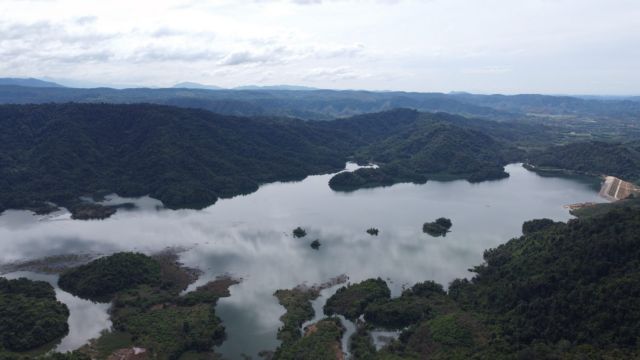[ad_1]
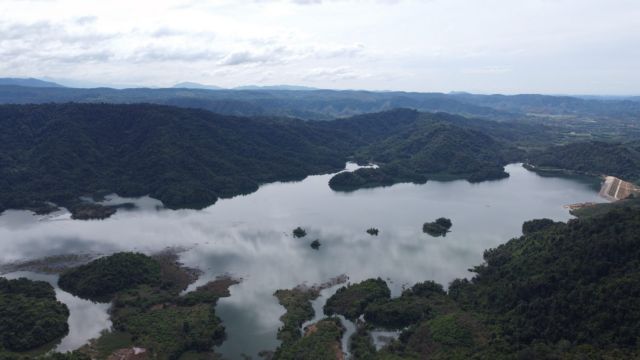
By Giang Thanh
Located 10km from the centre of Đạ Tẻ District, Lâm Đồng Province, Đạ Tẻ Lake appears in the endless green of primeval tropical forests and the majestic Con Ó mountain range.
After a three-day assignment in Đạ Tẻ District before the fourth COVID-19 wave hit the country, we had time to relax and decided to discover Đạ Tẻ Lake.
The lake, based in Mỹ Đức Commune, is a national scenic spot recognised in 2004. It is the largest irrigation lake in Lâm Đồng and is a nature conservation area with a tropical jungle ecosystem. This place is very diverse with plants and animals, and there are dozens of beautiful waterfalls around the lake
The name of the lake is also the name of a river. Đạ Tẻ River is the largest one flowing through the district. Đạ Tẻ, according to the language of the Mạ ethnic monirity, means hot water. It has this name because the water in this river is always warmer than the water in other rivers.
Đạ Tẻ Lake was formed by the construction of an irrigation dam across the river bed. The lake has an area of about 100ha, with a length of about 10km and the widest place is 400m, containing 24 million cubic metres of water.
The lake is irrigating more than 2,300ha of farm land in the communes of Mỹ Đức, Hà Đông, Quốc Oai, An Nhơn, Triệu Hải, Quảng Trị and Đạ Tẻ Town.
The lake has also contributed to renovate and change the ecosystem and natural landscape. People in the area also use the water surface area for farming and supplying aquatic products for local people and some neighbouring areas.
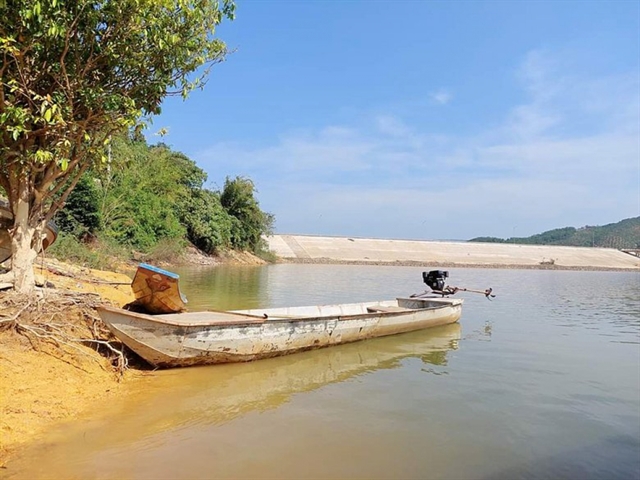
Besides those values, Đạ Tẻ Lake is also a beautiful landscape that attracts many tourists.
It has a mixed beauty among many famous landscapes of Lâm Đồng. It has the majestic beauty of Preen Waterfall, the fanciful sparkle of Xuân Hương Lake, the poetic vastness of Than Thở Lake, the wild and sad beauty of the Valley of Love.
We arrived at the lake on a sunny day. The lake’s surface is a bright blue. Sometimes a few waves ripple when the breeze blows.
At dawn, the mist still covers the lake, the shadows of the trees and mountains are far away. The blue sky is imprinted on the mirror-like water. The first rays of the sun are shining.
The spillway regulates the water source to create a waterfall-like thin curtain pouring down into the rock bed, making beautiful flows.
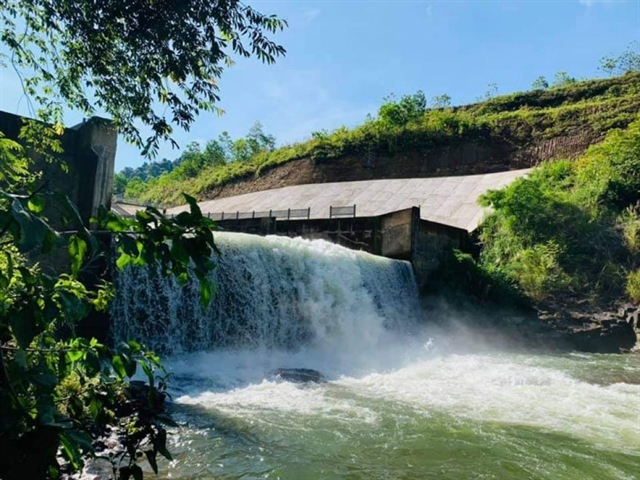
Going to the northeast upstream, the boat drove through the cliffs. On both sides of the forest bank are luxuriant old trees. The interlaced vines of the tropical rainforest made us lost in the wild as if there were no human footprints.
We silently watched the lake. Sometimes there were monkeys on the shore and in the groves, giving strange and interesting looks toward us.
Con Ó Village of the Mạ people is located right next to the lake with a canal running along the village, with wooden bridge crossing it.
Đạ Tẻ Lake has dispelled the burning sun, bringing the green colour of rubber and fruit trees, making people’s lives more prosperous every day, and preserving their cultural identities.
At night, among the sound of gongs and with home-brew wine, we heard the village elders tell stories about the village and the water source.
It was a long time ago, by the Đồng Nai River, by the dry streams that make up Đạ Tẻ Lake now, villages of the Mạ people lived peacefully. Suddenly, one day, Chà, an evil god of the Mạ, got angry, causing the water of the Đồng Nai River and dry streams here to overflow. The floodwaters rose and engulfed everything including houses, animals and people in the village.
The bravest young Mạ man in village was also struggling in the water. Animals and villagers tried to save him but could not. His scream reached the sky, startling Ka Yiêng, daughter of heaven. Looking down from the sky, she saw her lover struggling in the fast water and the whole village was in trouble.
Without hesitation, she asked for her father’s permission to come down to earth to save her lover and the villagers. The father agreed on one condition: “When you return to heaven, you will never return to earth to meet your lover again.” For the lives of the Mạ villagers, Ka Yiêng accepted.
Holding the sacred sword from her father, Ka Yiêng immediately went down to the Mạ village. She brandished her sword to defeat the floodwater. The Chà God withdrew. Her lover and the Mạ villagers were rescued. From devastation, with the power of the sacred sword, Ka Yiêng helped the Mạ rebuild their village, creating streams and rivers full of water year-round.
Its vestiges were small streams that were later blocked by a great long dam connecting two mountain slopes that rose to Đạ Tẻ Lake. After finishing her work, Ka Yiêng handed the sword back to his lover and never returned to earth.
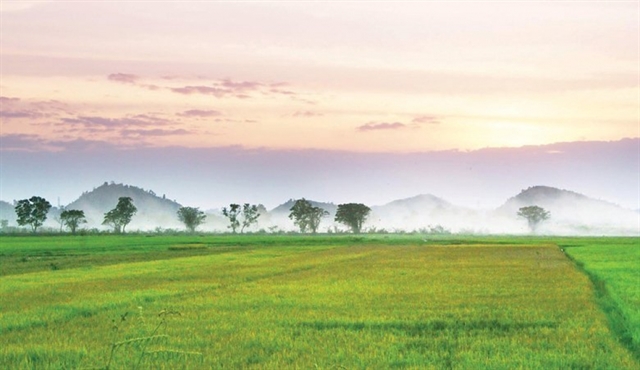
That legend was further written and multiplied by human strength when in 1990, Đạ Tẻ Lake started construction. Con Ó Village of the Mạ people which was located in the lake bed was relocated to higher ground right next to the lake. In 1997, Đạ Tẻ Lake was completed to become the largest irrigation dam in the province.
Leaving Lâm Đồng, bringing our luggage back to Hà Nội was interesting, but we will never forget the tranquility of Đạ Tẻ Lake. VNS
[ad_2]
Source link
